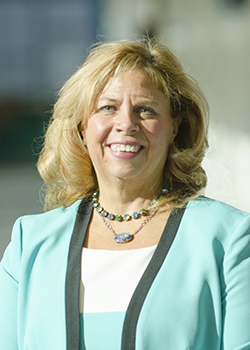Advocating For Your Child’s Health
MetroHealth pediatricians are available across the county. To find the right pediatrician near you, call 216-778-2222 or visit metrohealth.org/pediatrics
To access the entire SimplyWell patient advocate series, visit metrohealth.org/simplywell
When our children are sick, there is almost nothing we wouldn’t do to get them the help they need. But what is the best way for parents to speak up for little ones who may not be able to explain what’s wrong? In this final article in our patient advocate series, you’ll read about how one mom’s intuition, and help from MetroHealth internal medicine pediatrician Holly Perzy, MD, led to the answers that saved her baby’s life.
After Mary Ortenzi had her daughter Sydney, she found herself unexpectedly advocating for her newborn. Already a mother to three other children, Mary quickly realized there was something off with her baby’s behavior.
Q: When did you know something was wrong with Sydney’s health?
A: I noticed she wasn’t urinating the way newborns typically do. She wasn’t creating a lot of wet diapers. When I called my pediatrician, Dr. Perzy, to schedule the regular 2-week-old newborn appointment, I mentioned I was concerned. Dr. Perzy said she wanted to see Sydney right away. She was only 2 or 3 days old.
Q: What happened at the appointment?
A: Dr. Perzy really listened to my concerns and didn’t act like I was having the anxiety sometimes associated with taking care of a newborn. Sydney and I were there for quite a long time, because we were trying to get a urine sample from her. Dr. Perzy also scheduled an ultrasound of the kidney, because my amniotic fluid was low at the end of the pregnancy, and amniotic fluid has kidney waste in it. She wanted to check Sydney’s kidney function.
Q: What did the ultrasound find?
A: The ultrasound showed an enlargement of Sydney’s left adrenal gland. The adrenals sit on top of kidneys and help with your fight or flight response. You can function without them if they have to be removed. We were told to come back in two months for another ultrasound to see if the growth had dissipated. Dr. Perzy told me not to do too much research on the internet about what the growth could be, because it would only cause me to worry more than I already was.
Q: What were those two months like?
A: Sydney’s urination normalized but in the back of my mind, I still felt like something wasn’t right. Then the second ultrasound showed the growth was still there, so Dr. Perzy ordered a CT scan and an MRI. When she called me with the results, she said the growth could be a neuroblastoma, a common childhood cancer.
Q: How did Dr. Perzy ensure your daughter was getting the right care at this point?
A: She referred me to a pediatric urologist who said we had to take out the growth, because it could be cancer. Sydney had the surgery and doctors found the tumor was completely encased in the adrenal gland, so they took out the whole thing. After the surgery, we found out the growth was cancer. It was a shock. But the good news is Sydney never needed chemo or radiation because no tumor cells were left behind, and today she is cancer-free.
Q: What advice do you have for other parents who are advocating for their child’s health?
A: When I look back, I think, thank God someone listened to me and that we had a doctor who delved into Sydney’s health problems and didn’t brush them off. The lesson is to trust your gut when it’s telling you something isn’t right. Insist that someone listens. If one person doesn’t listen, go see someone else who does.
A Doctor’s Tips for Advocating for Your Children
Dr. Perzy understands the importance of parents advocating for their children. “As a parent, you know your child best,” she said. “I’ve learned that parents often have a sixth sense when it comes to their children, and my job is to respect that and listen to their concerns. Then I use my medical expertise to work with them, so together, we are a team to help their child.”
She has the following tips for making sure your kids get the health care they need:
- Don’t be afraid to search for a pediatrician who you think will listen and understand where you are coming from. This relationship is key, and it may take a few different doctors until you find one you click with.
- Make sure you understand what your pediatrician is saying. Ask him or her to avoid medical jargon. Don’t be afraid to ask questions until you fully understand.
- Don’t do too much research on the internet about your child’s symptoms. The web contains a lot of misinformation that can increase your stress level. Once you find a doctor you trust, talk to him or her about your concerns.
- Your child is not a just number, so don’t dwell on statistics about your child’s health condition. Depending on the illness, this information can be scary. Be open about your fears and communicate them to your child’s doctor.
- Take time out to make sure your child feels comforted and supported. MetroHealth offers a Child Life and Education Program that helps families manage the hospital experience and cope with stress.
MetroHealth pediatricians are available across the county. To find the right pediatrician near you, call 216-778-2222 or visit metrohealth.org/pediatrics
To access the other SimplyWell patient advocate stories from this series, visit:
Contributor:

Holly Perzy, MD
Internal Medicine Pediatrician











